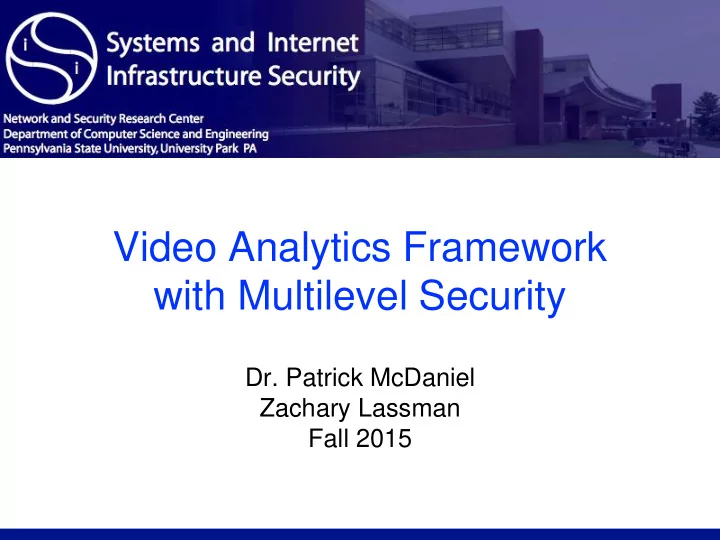

Video Analytics Framework with Multilevel Security Dr. Patrick McDaniel Zachary Lassman Fall 2015
Video Analytics Network • Distributed video database that can be queried on video metadata and feature classifications • “Just -In- Time” video processing for feature classification • Computational offloading from mobile devices to MicroClouds Page
Network Structure Page
Video Processing • Frame extraction • Frame classification • Compilation of frame classification probabilities • Tests conducted on 1080p mp4 video at approx. 30 fps Page
• OpenCV on server ‣ Bottleneck of server-side video processing ‣ Approx. 50 ms / frame • FFmpeg on mobile devices ‣ Approx. 500 ms / frame Page
Classification • Caffe deep learning framework using neural networks developed by Berkeley Vision and Learning Center • Using models trained at ARL • Slow on mobile devices ‣ Approx. 2000 ms / frame for 1080p mp4 Page
Hardware Acceleration • NVIDIA GeForce GTX Titan X GPU • Caffe built using NVIDIA cuDNN • Orders of magnitude faster ‣ Approx. 7 ms / frame Page
Communication Google Protocol Buffers • Serialize and parse data represented by objects • Efficient encoding • Backwards compatible • Code compiled from .proto file Protobuf messages generated and prefixed with message size using varint encoding Page
Timing Data Page
Timing Data Page
Query Initiation Page
Distributed Processing Page
Future Work (non-security) • Further parallelization • Query propagation from central command server and mobile devices • Multiple GPU’s / MicroClouds • General optimization ‣ Frame extraction ‣ Network communication ‣ Database caching Page
MLS • Application of computer system to process information with incompatible classifications • Based on military access control model Page
Military Access Control • Classifications: ‣ Top Secret ‣ Secret ‣ Confidential ‣ Unclassified • Information may only flow upwards through classifications ‣ One can only view documents classified at or below their clearance • Compartmented need-to-know access Page
Bell-LaPadula Model • Model of computer security formulated in context of government classification • Enforces two properties: ‣ Simple security property (no read up) : no process may read data at a higher level ‣ *-property (no write down) : no process may write data to a lower level • Does not allow for approved interactions across classifications or changes to classification • Deals only with confidentiality Page
Alternatives • Noninterference : High’s actions have no effect on what Low can see • Nondeducibility : Low cannot deduce anything with 100 percent certainty about High’s input • Harrison-Russo-Ullman model : handles creation and deletion of files; operates on access matrices • Type enforcement : used in SELinux ‣ Subjects assigned domains , objects assigned types ‣ Matrices defining permitted domain-domain and domain- type interactions • Role-based access control : access depends on user’s role in organization Page
Biba Model • Deals only with data integrity and ignores confidentiality • Read up and write down • NO read down and write up as high integrity objects could become contaminated with low • Used in many modern computer systems: system files as high and network as low • Does not allow trusted subjects to override security model Page
MLS Applications • SCOMP • Blacker • MLS Unix • NRL Pump • Logistics Systems • Sybard Suite • Wiretap Systems Page
Covert Channels • Unintentional channel that can be abused to allow data flow from high to low confidentiality • If high and low processes run on single system without partitioned resources, high process can signal low process to initiate data transfer Page
Application to Project • MLS scheme for videos and video metadata • Restricted access of certain classifications/locations • Compartmentalized for collaboration among organizations • Eliminate covert channels to prevent information leakage (obviously) Page
Recommend
More recommend